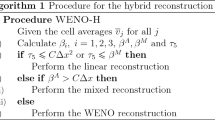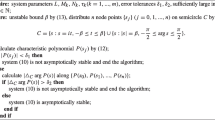Abstract
This paper proposes a data-based approach for model order reduction that preserves incremental stability properties. Existing data-based approaches do typically not preserve such incremental system properties, especially for nonlinear systems. As a result, instability of the constructed model commonly occurs for inputs outside the training set, which seriously limits the usefulness of such models. Therefore, we propose to construct incrementally stable or incrementally \(\ell _2\)-gain stable reduced-order nonlinear models to ensure robustness for a broad class of (bounded) input signals. Hereto, nonlinear discrete-time state-space equations are fitted to input-state-output data, obtained by simulations with the original model. We conjecture that certain classes of hyperbolic partial differential equations enjoy such incremental stability properties. Given the fact that complexity reduction in such PDE models is desirable, we employ the developed data-based reduction method to the discretized version of the hyperbolic equations thereby preserving the incremental stability features of the original system. In particular, this method is applied to a linear advection equation, for which stability properties are proved analytically. Finally, simulation results show the successful application of the method to the nonlinear Burgers’ equation.












Similar content being viewed by others
Availability of data and material
The datasets generated during and/or analyzed during the current study are available from the corresponding author on reasonable request.
Notes
Not the Rusanov scheme due to the “max” operator.
References
Papachristodoulou, A., Anderson, J., Valmorbida, G., Prajna, S., Seiler, P., Parrilo, P.A.: SOSTOOLS: Sum of squares optimization toolbox for MATLAB. arxiv:1310.4716 (2013). Available from http://www.eng.ox.ac.uk/control/sostools, http://www.cds.caltech.edu/sostools and http://www.mit.edu/~parrilo/sostools
Abbasi, M.H., Iapichino, L., Besselink, B., Schilders, W., van de Wouw, N.: Error estimation in reduced basis method for systems with time-varying and nonlinear boundary conditions. Comput. Methods Appl. Mech. Eng. 360, 112688 (2020)
Abbasi, M.H., Iapichino, L., Besselink, B., Schilders, W.H.A., van de Wouw, N.: Error estimates for model order reduction of Burgers’ equation. IFAC-PapersOnLine 53(2), 5609–5616 (2020)
Ahn, C.K.: \(l_2-l_\infty \) nonlinear system identification via recurrent neural networks. Nonlinear Dyn. 62, 543–552 (2010)
Angeli, D.: A Lyapunov approach to incremental stability properties. IEEE Trans. Autom. Control 47(3), 410–421 (2002)
Antoulas, A.: Approximation of large-scale dynamical systems. Society for Industrial and Applied Mathematics (2005)
Arcak, M., Meissen, C., Packard, A.: Network of Dissipative Systems. Springer Briefs in Electrical and Computer Engineering (2016)
Besselink, B., van de Wouw, N., Nijmeijer, H.: Model reduction of nonlinear systems with bounded incremental \(l_2\) gain. In: IEEE 50th Conference on Decision and Control and European Control Conference (CDC-ECC), Orlando, FL, USA, pp. 7170–7175 (2011)
Besselink, B., van de Wouw, N., Nijmeijer, H.: Model reduction for nonlinear systems with incremental gain or passivity properties. Automatica 49, 861–872 (2013)
Chaillet, A., Pogromsky, A., Ruffer, B.: A Razumikhin approach for the incremental stability of delayed nonlinear systems. In: 52nd IEEE Conference on Decision and Control CDC 2013,Dec 2013, Florence, Italy, pp. 1596–1601 (2013)
Condon, M., Ivanov, R.: Empirical balanced truncation of nonlinear systems. J. Nonlinear Sci. 14, 405–414 (2004)
Cuong, D.H., Thanh, M.D.: A Godunov-type scheme for the isentropic model of a fluid flow in a nozzle with variable cross-section. Appl. Math. Comput. 256, 602–629 (2015)
Fresca, S., Dede, L., Manzoni, A.: A comprehensive deep learning-based approach to reduced order modeling of nonlinear time-dependent parametrized pdes. arXiv:2001.04001 (2020)
Fromion, V., Scorletti, G.: A theoretical framework for gain scheduling. Int. J. Robust Nonlinear Control 13(10), 951–982 (2003)
Gugercin, S., Antoulas, A.: A survey of model reduction by balanced truncation and some new results. Int. J. Control 77(8), 748–766 (2004)
Hesthaven, J.S., Rozza, G., Stamm, B.: Certified reduced basis methods for parametrized partial differential equations. Springer Briefs in Mathematics. Springer International Publishing (2016)
Kerschen, G., Golinval, J.C., Vakakis, A.F., Bergman, L.A.: The method of proper orthogonal decomposition for dynamical characterization and order reduction of mechanical systems: An overview. Nonlinear Dyn. 41, 147–169 (2005)
Khalil, H.K.: Nonlinear systems, 3, edition Pearson. Upper Saddle River, N.J (2001)
Kramer, B., Willcox, K.: Nonlinear model order reduction via lifting transformations and proper orthogonal decomposition. In: American Institute of Aeronautics and Astronautics, vol. 57 (2019)
Kurganov, A., Tadmor, E.: New high-resolution central schemes for nonlinear conservation laws and convection-diffusion equations. J. Comput. Phys. 160(1), 241–282 (2000)
Lasserre, J.: Global optimization with polynomials and the problem of moments. SIAM J. Optim. 11(3), 796–817 (2001)
LeVeque, R.: Finite Difference Methods for Ordinary and Partial Differential Equations. Soc. Ind. Appl. Math. (2007)
Liang, J., Cao, J., Lam, J.: Convergence of discrete-time recurrentneural networks with variable delay. Int. J. Bifurc. Chaos 15(2), 581–595 (2005)
Ljung, L.: System Identification: Theory for the User, 3rd edn. Prentice-Hall, Englewood Cliffs (1999)
Löfberg, J.: Yalmip: a toolbox for modeling and optimization in matlab. In: Proceedings of the CACSD Conference, Taipei, Taiwan (2004)
Lohmiller, W., Slotine, J.: On contraction analysis for non-linear systems. Automatica 34, 683–696 (1998)
Miller, J., Hardt, M.: Stable recurrent models. In: International Conference on Learning Representations (2019)
Orlandi, P.: The Burgers equation. In: Fluid Flow Phenomena: A Numerical Toolkit. Fluid Mechanics and Its Applications, pp. 40–50. Springer, Netherlands (2000)
Pascanu, R., Mikolov, T., Bengio, Y.: On the difficulty of training recurrent neural networks. In: Proceedings of the 30\(^{th}\) International Conference on Machine Learning, Atlanta, GA, USA, vol. 28, pp. 1310–1318 (2013)
Pavlov, A., Pogromsky, A., van de Wouw, N., Nijmeijer, H.: Convergent dynamics, a tribute to Boris Pavlovich Demidovich. Syst. Control Lett. 52(3–4), 257–261 (2004)
Pola, G., Pepe, P., Di Benedetto, M., Tabuada, P.: Symbolic models for nonlinear time-delay systems using approximate bisimulations. Syst. Control Lett. 59(6), 365–373 (2020)
Qian, E., Kramer, B., Marques, A., Willcox, K.: Transform & learn: A data-driven approach to nonlinear model reduction. In: AIAA Aviation 2019 Forum (2019)
Raissi, M., Perdikaris, P., Karniadakis, G.: Physics-informed neural networks: A deep learning framework for solving forward and inverse problems involving nonlinear partial differential equations. J. Comput. Phys. 378, 686–707 (2019)
Reiss, J., Schulze, P., Sesterhenn, J., Mehrmann, V.: The shifted proper orthogonal decomposition: a mode decomposition for multiple transport phenomena. SIAM J. Sci. Comput. 40(3), A1322–A1344 (2018)
Revay, M., Manchester, I.: Contracting implicit recurrent neural networks: stable models with improved trainability. In: Proceedings of Machine Learning Research, vol. 120, pp. 1–11 (2020)
Romanchuk, B., James, M.: Characterization of the \(l_p\) incremental gain for nonlinear systems. In: IEEE 35th Conference on Decision and Control (CDC), Kobe, Japan, pp. 3270–3275 (1996)
San, O., Maulik, R., Ahmed, M.: An artificial neural network framework for reduced order modeling of transient flows. Commun. Nonlinear Sci. Numer. Simul. 77, 271–287 (2019)
Scherpen, J.: Balancing for nonlinear systems. Syst. Control Lett. 21, 143–153 (1993)
Tobenkin, M., Manchester, I., Megretski, A.: Convex parameterizations and fidelity bounds for nonlinear identification and reduced-order modelling. IEEE Trans. Autom. Control 62(7), 3679–3686 (2017)
Tran, D., Ruffer, B., Kellett, C.: Convergence properties for discrete-time nonlinear systems. IEEE Trans. Autom. Control 64(8), 3415–3422 (2019)
Umenberger, J., Manchester, I.: Convex bounds for equation error in stable nonlinear identification. IEEE Control Syst. Lett. 3(1), 73–78 (2019)
Verhoek, C., Koelewijn, P., Toth, R.: Convex incremental dissipativity analysis of nonlinear systems. arXiv:2006.14201v1 (2020)
Zhang, Y., Feng, L., Li, S., Benner, P.: An efficient output error estimation for model order reduction of parametrized evolution equations. SIAM J. Sci. Comput. 37(6), B910–B936 (2015)
Funding
This research has been carried out in the HYDRA project, which has received funding from the European Union’s Horizon 2020 research and innovation program under grant agreement No 675731.
Author information
Authors and Affiliations
Corresponding author
Ethics declarations
Conflict of interest
The authors declare that they have no conflict of interest.
Code availability
The code generated during and/or analyzed during the current study is available from the corresponding author on reasonable request.
Additional information
Publisher's Note
Springer Nature remains neutral with regard to jurisdictional claims in published maps and institutional affiliations.
Rights and permissions
About this article
Cite this article
Abbasi, M.H., Iapichino, L., Schilders, W. et al. A data-based stability-preserving model order reduction method for hyperbolic partial differential equations. Nonlinear Dyn 107, 3729–3748 (2022). https://doi.org/10.1007/s11071-021-07094-8
Received:
Accepted:
Published:
Issue Date:
DOI: https://doi.org/10.1007/s11071-021-07094-8
Keywords
- Model order reduction
- Hyperbolic partial differential equation
- Data-based reduction
- Stability preservation
- Non-intrusive model order reduction




